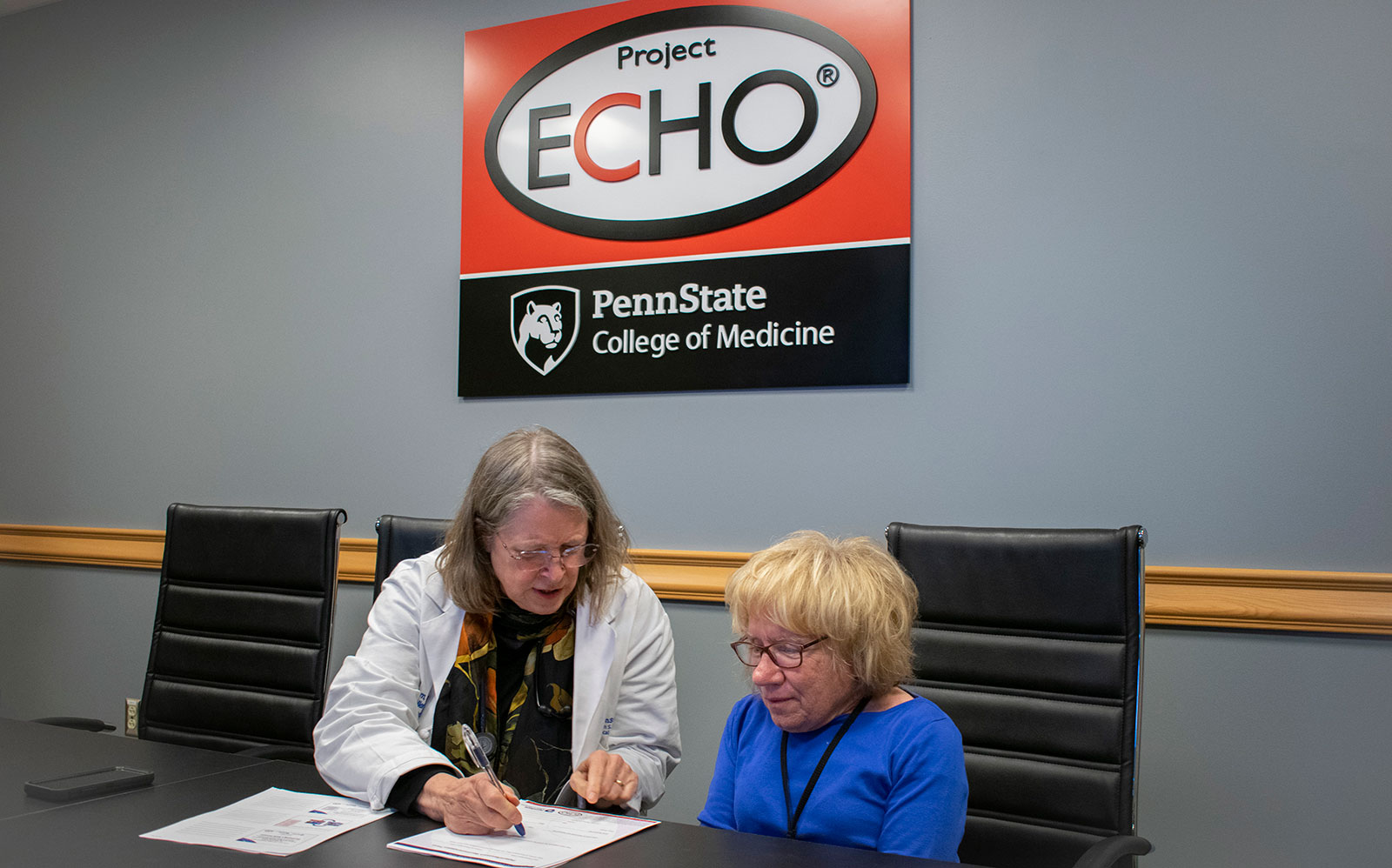Rare disease research benefits from institute support

Research on the Ehlers-Danlos syndromes, a group of rare heritable disorders of connective tissue, is supported through Penn State Clinical and Translational Science Institute.
The institute funded two pilot projects through its Bridges to Translation Pilot Grant Program. The first pilot grant led to the acquisition of a dataset for analysis and Penn State’s involvement with the Ehlers-Danlos Society and its national Co-Morbidity Coalition project. The second grant uses the Project ECHO collaborative care model to evaluate the education of primary care physicians in the care of people with Ehlers-Danlos syndromes.
The Clinical and Translational Science Institute supported the first project because of its translational science potential. By understanding what the dataset included and showed, further research questions could be posed to help those with these diseases. For example, Penn State postdoctoral scholar Amanda Miller used data from this dataset to examine the relation between stretchiness of the arteries and blood pressure in people with Ehlers-Danlos syndromes. She presented this data at a national meeting and is writing a paper on it. Penn State faculty member and sleep researcher Julio Fernandez-Mendoza presented at a national meeting on sleep outcomes. Through the pilot grant, the research team also created an advisory group to incorporate patient feedback in determining potential research questions. The Clinical and Translational Science Award program is committed to this type of community engagement.
The rich Ehlers-Danlos syndromes dataset acquired by Penn State researchers came from a National Institute on Aging study conducted between 2001 and 2013. The transferred data were analyzed by Penn State investigators Jane Schubart, associate professor of surgery, and Dr. Rebecca Bascom, professor of medicine.
“This was a landmark study,” Bascom said. “The individual participant data was collected over a decade but had not been aggregated, analyzed and published. The patient community advocated making the data available to researchers. The Clinical and Translational Science Institute understood this great opportunity and supported us without our having a previous track record in Ehlers-Danlos. It was essential to our growing success because its leadership believed in our idea and was willing to take a chance with seed funding. I’m not sure how we would have gotten started without its help and the pilot grant investment.”
The pilot grant funding helped forge new collaborations, an important goal of the Clinical and Translational Science Award program. Essential partnerships formed with the Ehlers-Danlos Society, including Lara Bloom, president and CEO of the Ehlers-Danlos Society, and Dr. Alan Hakim, chief medical officer and a UK-based rheumatologist. Dr. Hakim is now an adjunct associate professor of medicine at Penn State. Bloom’s expertise in patient engagement and global collaboration will be showcased at a March 2020 follow-up conference at Penn State.
The second Clinical and Translational Science Institute-funded project evaluates the effectiveness of using Project ECHO for the Ehlers-Danlos Syndromes. Project ECHO at Penn State College of Medicine offers a unique learning experience and support network. ECHO, which stands for Extension for Community Healthcare Outcomes, gives primary care physicians the tools they need and a professional network to treat patients in regions with little or no access to specialists. It links expert specialist teams at an academic ‘hub’ with primary care clinicians in local communities – the ‘spokes’ of the model. Together, they participate in weekly virtual clinics with mentoring and patient case presentations. The Clinical and Translational Science Institute provides office space and important infrastructure for Project ECHO.
Ehlers-Danlos syndromes may involve almost every organ system in the body and looks different between patients. Diagnosis is often complicated and can be mistakenly attributed to psychological problems.
“People with Ehlers-Danlos syndromes are a vulnerable group who are falling through the cracks in our health care system,” Schubart said. “Primary care physicians with expertise in treating Ehlers-Danlos syndromes are difficult to find and specialists have waiting lists of two-to-three years.”
Through Project ECHO, 12 educational sessions will be held over six months, providing expert knowledge on caring for patients with Ehlers-Danlos. Dr. Clair Francomano, a preeminent clinician and researcher on the subject, will be part of the sessions. Researchers will evaluate both the program implementation and its performance to determine whether the program will increase quality and access to Ehlers-Danlos syndromes specialty care.
“The support of the Clinical and Translational Science Institute has been essential and has made possible our growing portfolio of collaborative research,” Schubart said. “In early 2018, we hosted a symposium, bringing together medical professionals from all over the world to work on Ehlers-Danlos syndromes and related co-morbid conditions. We’ve now published key articles describing the National Institute of Aging cohort. Our patient research advisory continues to provide invaluable guidance. Our goal is to extend and translate our research to make meaningful improvements in the quality of care and lives of people with the Ehlers-Danlos syndromes.”
Because of their work through the Bridges to Translation pilot grant program, the researchers have also received additional funding through the Patient-Centered Outcome Research Institute. They will establish a model to build capacity for clinician-researcher partnerships in patient-centered care.
“The Clinical and Translational Science Institute’s Bridges to Translation program shows the incredible value of the institute for establishing new partnerships to address difficult rare diseases, and enables us to extend the strengths of the university health center to the community at large,” Bascom said.
Several papers have been published or are in process, including:
- Use of cluster analysis to delineate symptom profiles in Ehlers-Danlos syndrome patient population
- Heritable disorders of connective tissue: Description of a data repository and initial cohort characterization
- Use of prescription opioids and other drugs among a cohort of persons with Ehlers-Danlos syndrome: A retrospective study
If you're having trouble accessing this content, or would like it in another format, please email the Penn State College of Medicine web department.
